Is your cat an insomniac, keeping you awake with non-stop meowing? This can be a common issue for many pet owners, generally indicating that Fluffy has particular needs or concerns.
Our comprehensive blog post will help decipher the reasons behind your cat’s night time concerts and offer practical solutions to encourage quiet nights. Keep reading – this is your guide to reclaiming peaceful slumber!
Key Takeaways
- Cats meow at night for various reasons, such as seeking attention, hunger or thirst, boredom or loneliness, aging, and medical issues.
- To help your cat stay quiet at night, reset their body clock by establishing a consistent sleep schedule and providing playtime in the evening to tire them out.
- Make sure your cat has access to food and water before bed to reduce nighttime meowing due to hunger or thirst.
- Clean the litter box before going to bed to prevent discomfort or stress for your cat during the night.
Contents
Why Do Cats Meow at Night?
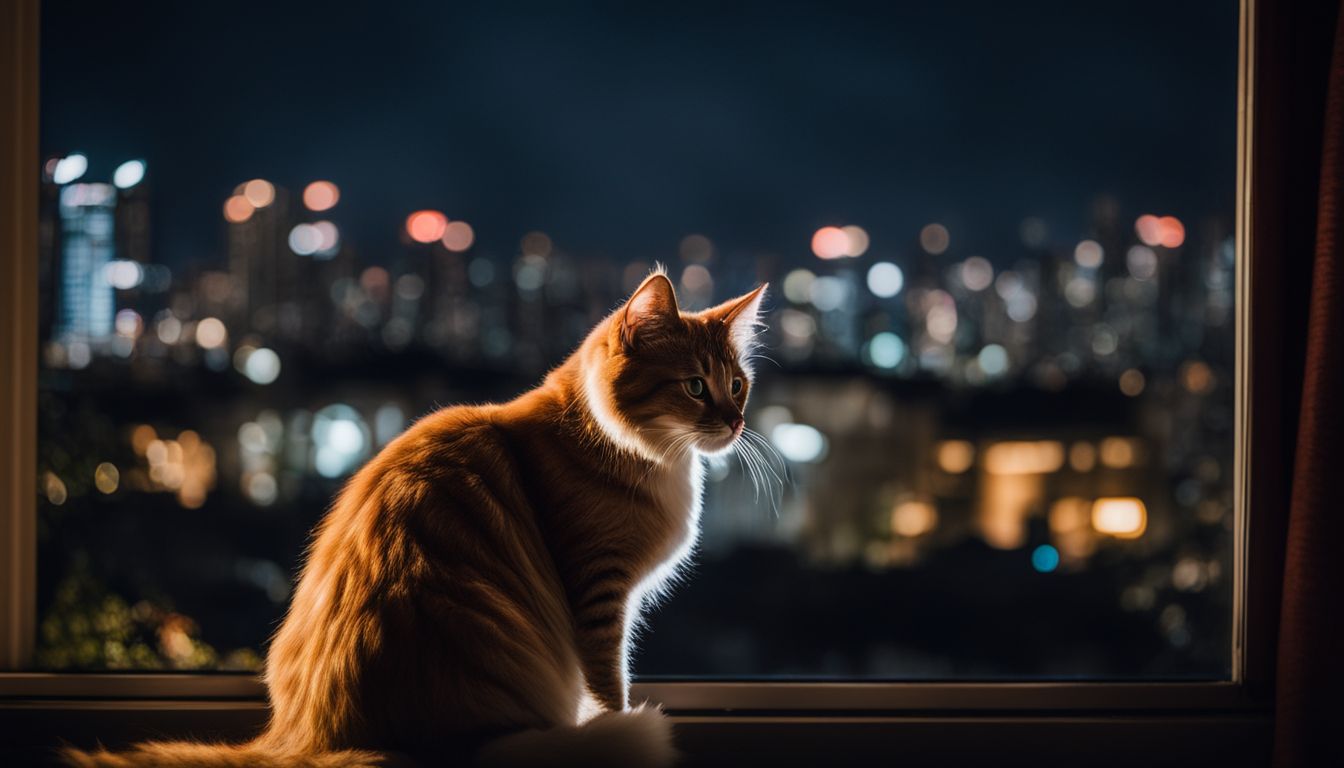 Cats meow at night for various reasons, such as seeking attention, hunger or thirst, boredom or loneliness, aging, and medical issues.
Cats meow at night for various reasons, such as seeking attention, hunger or thirst, boredom or loneliness, aging, and medical issues.
1. Seeking attention
Cats love to grab your focus. They do this by meowing at night sometimes. Your cat might feel alone when you’re asleep. She uses her voice to get you up and give her some time. It’s like a child asking for a late-night story! One way to stop this is to spend more fun time with your cat before bed.
Play games or pet her a lot. This can help tire out your cat and make her sleep through the night.
2. Hunger or thirst
Cats may meow at night if they are hungry or thirsty. We all feel grumpy when we don’t have enough to eat or drink, and cats are no different. Sometimes, your cat might want a late-night snack.
Make sure you feed your cat before bed so it won’t get hungry at night.
Also, check the water dish to see if there’s fresh water available for your cat. Cats like their water clean and fresh just as much as we do! Their meowing could be telling you that they need more food or clean drinking water during the night hours.
3. Boredom or loneliness
Your cat might feel lonely at night. This is more common in cats that live alone. They may get bored when you are asleep and they have nothing to do. This can lead them to meow a lot.
To fix this, try playing with your cat before bed. It will use up their energy and help them sleep better at the same time. You can also leave toys out for your cat to play with by itself during the night.
Cats love new things, so changing these toys from time to time can keep them interested.
4. Aging
As cats get older, they may experience changes in their behavior, including meowing more at night. This could be due to age-related conditions such as cognitive decline or physical discomfort.
Older cats may also feel more anxious or disoriented during nighttime hours. To help aging cats stay calm and quiet at night, it’s important to provide a comfortable and secure sleeping area, ensure they have easy access to food and water, and consider using nightlights to alleviate any vision problems.
Additionally, regular vet check-ups can help identify any underlying medical issues that might be causing the excessive meowing at night.
5. Medical issues
Sometimes, cats meow at night because of medical issues. Conditions like constipation, urinary tract infections, or urinary stones can cause discomfort and make your cat vocalize more.
Hyperthyroidism and kidney disease are also common medical problems that can lead to excessive meowing at night. It’s important to take your cat to the veterinarian if you suspect any health issues.
They will be able to diagnose and treat the problem so that your cat can have a good night’s sleep.
How to Teach Your Cat to Stay Quiet at Night
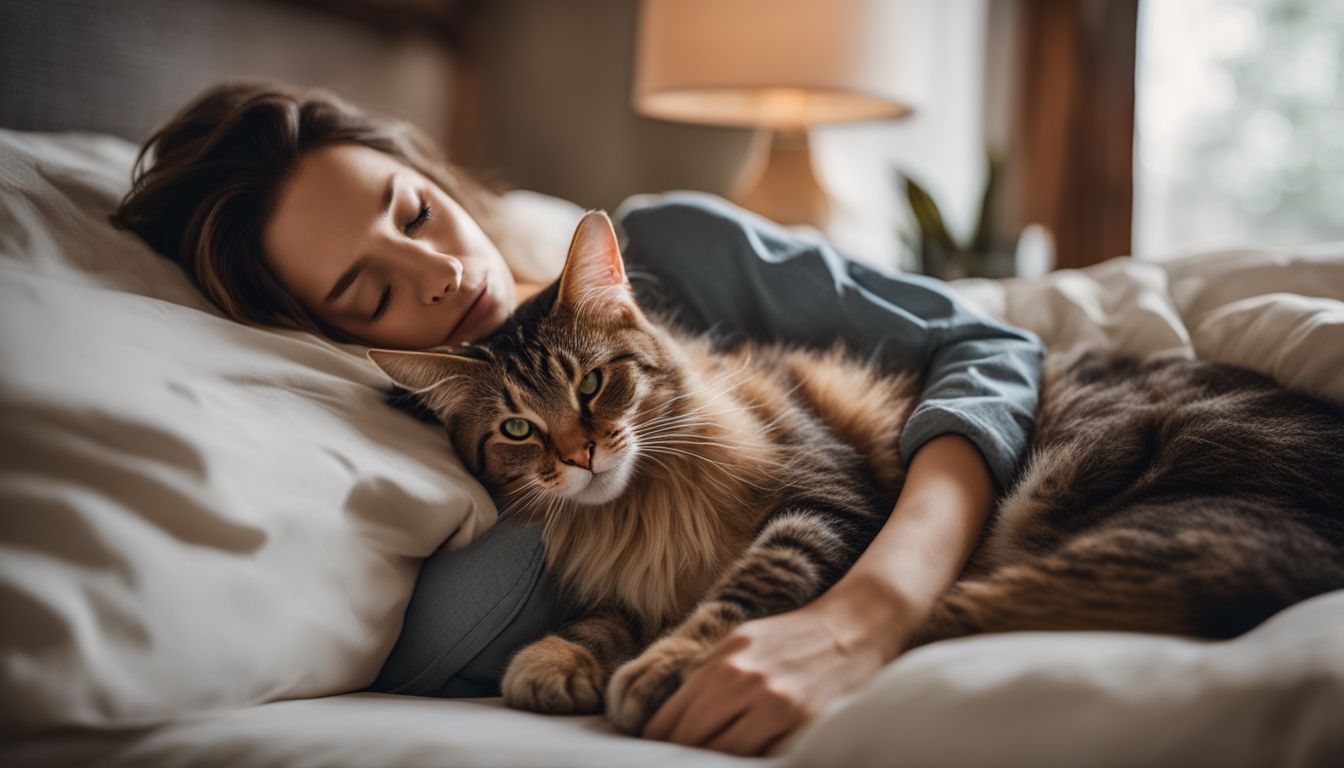
Reset your cat’s body clock, provide them with essential needs like food and water before bed, scoop their litter box, give playtime and affection, and consider using nightlights for senior cats.
1. Reset their body clock
To help your cat stay quiet at night, it’s important to reset their body clock. This means establishing a consistent sleep schedule for them. Cats are naturally crepuscular animals, meaning they are most active during dawn and dusk.
By creating a routine that mimics these natural periods of activity, you can encourage your cat to sleep during the night and be awake when you’re around during the day. Provide playtime and stimulation in the evening before bed to tire them out, then ensure they have a comfortable sleeping area away from any disturbances.
Consistency is key when resetting their body clock, so stick to the same routine every day.
2. Provide essentials like food and water
Make sure your cat has access to food and water throughout the night. Cats can become hungry or thirsty during the night, which may cause them to meow for attention. By giving them enough food and water before bedtime, you can help reduce their need to wake you up in search of a meal or drink.
Keep their bowls clean and filled regularly, ensuring that they have everything they need close by so they don’t feel the urge to bother you during the night for these basic necessities.
3. Scoop the litter box before bed
Ensure to clean the litter box before going to bed. This can help reduce any potential discomfort or stress for your cat during the night. Cats are naturally clean animals and prefer a tidy and odor-free litter box.
By scooping out the waste, you create a more inviting environment for them to use their litter box when needed. Keeping it clean also helps prevent any unwanted accidents or inappropriate elimination behaviors in your home.
So, make it a habit to scoop the litter box before bedtime to keep your cat happy and comfortable throughout the night.
4. Give playtime and affection before bed
Make sure to give your cat some playtime and affection before bed. This will help tire them out and make them feel loved, which can reduce nighttime meowing. Play with toys that engage their hunting instincts, like a feather wand or laser pointer.
Petting and cuddling your cat also provides comfort and reassurance before they settle down for the night. By giving them attention and exercise, you’re helping to fulfill their needs and promote a peaceful sleep routine.
5. Use nightlights for senior cats
Senior cats may experience vision changes as they age, and this can make navigating in the dark more challenging for them. To help them feel more secure at night, consider using nightlights in areas where your cat spends time.
Nightlights can provide a dim but comforting source of light that helps senior cats see better and avoid any accidents or bumps. By illuminating their surroundings, nightlights can ease their anxiety and prevent unnecessary meowing at night due to disorientation or fear of darkness.
Refraining from Responding to Night-time Meowing
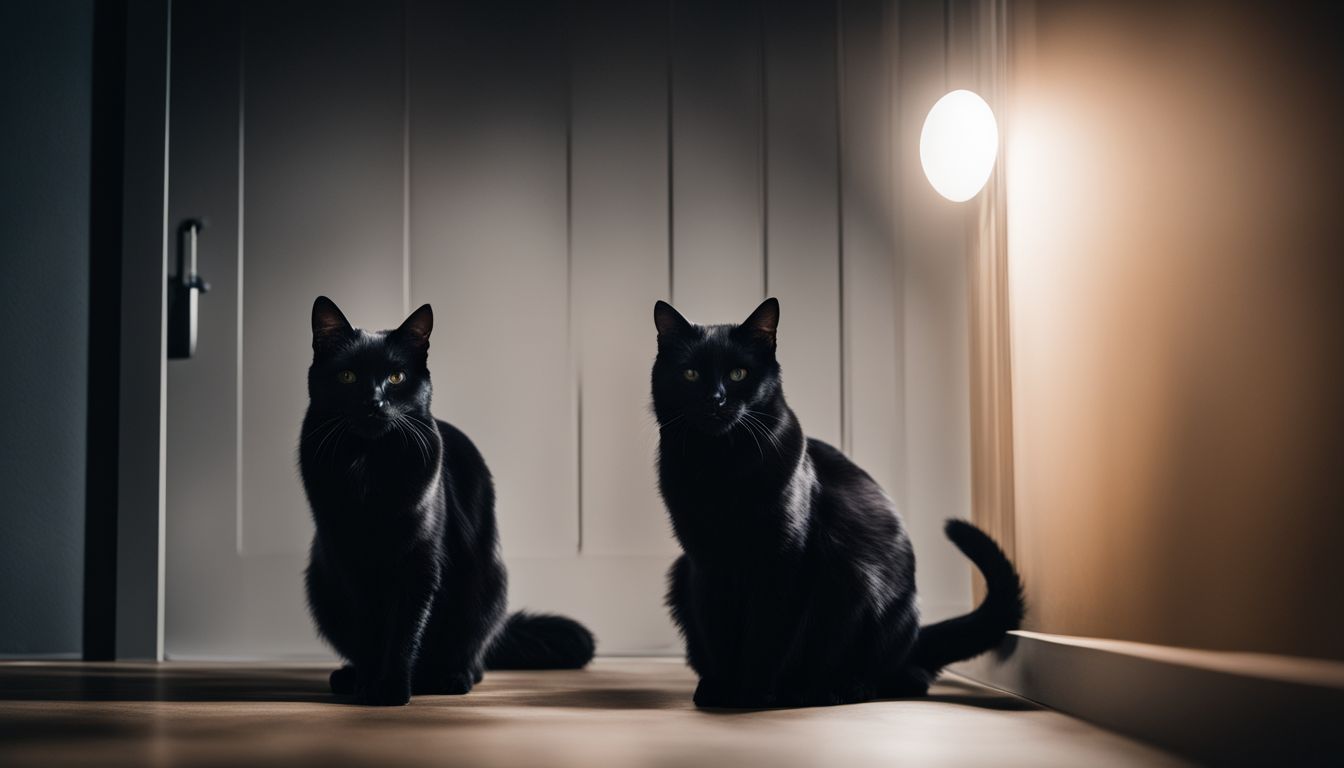
Ignore your cat’s meowing at night, as responding to it will reinforce the behavior and encourage further meowing.
The importance of not giving in
It’s important not to give in to your cat’s nighttime meowing. Even though it can be tempting to respond, doing so might reinforce their behavior. If you consistently give in and provide attention or food whenever they meow at night, they will learn that meowing gets them what they want.
Instead, try to ignore the meows and only reward quiet behavior. It may take some time for your cat to understand that meowing won’t get them what they want, but with consistency, they should eventually learn to be quieter at night.
Consistency is key
Consistency is very important when teaching your cat to stay quiet at night. You need to stick to a routine and follow it every night. This helps your cat understand what behavior is expected of them.
For example, if you want your cat to stop meowing for attention at night, do not give in and respond to their demands. If you consistently ignore their meowing, they will learn that it doesn’t work and eventually stop doing it.
It’s also important to be consistent with providing food, water, playtime, and affection before bed so that your cat feels satisfied and content. By being consistent in your approach, you can effectively teach your cat how to behave quietly during the night without giving in or getting frustrated.
Additionally, consistency is key when dealing with any nighttime disturbances caused by lights or sounds that may bother your cat. Make sure you identify these disturbances and take steps to eliminate them as much as possible.
Creating a calm and comfortable environment for your cat will help reduce their nighttime meowing.
Additional Tips for Quieting Night-time Meows

Check for lights or sounds that may disturb your cat, as these can contribute to their nighttime meowing. Establish a bedtime routine to help your cat feel secure and calm. Consider using calming aids such as pheromone diffusers or herbal supplements formulated for cats.
Check for lights or sounds that may disturb your cat
Make sure to check your cat’s sleeping area for any lights or sounds that could be disturbing them during the night. Cats have sensitive senses and even small noises or bright lights can disrupt their sleep.
Turn off any unnecessary lights or close curtains to create a dark and quiet environment for your cat to rest in. This can help minimize their nighttime meowing and promote better sleep for both you and your furry friend.
Establish a bedtime routine
To help your cat stay quiet at night, it’s important to establish a bedtime routine. Consistency is key here. Try to create a calm and soothing environment in the evening by keeping noise levels low and dimming the lights.
Set aside some time for play and cuddles before bed to tire your cat out. It can also help to feed them their final meal of the day right before you go to sleep, so they have a full belly.
By following a consistent routine every night, you can help signal to your cat that it’s time for rest and discourage excessive meowing during bedtime hours without giving in or reinforcing the behavior.
Consider using calming aids
To help calm your cat and reduce nighttime meowing, you may want to consider using calming aids. These can be helpful if your cat is experiencing anxiety or stress that is causing them to meow excessively at night.
Calming aids come in different forms, such as pheromone diffusers, sprays, or collar attachments. These products release synthetic versions of naturally occurring feline pheromones that can help create a sense of security and relaxation for your cat.
You can find these items at pet stores or online. Before using any calming aid, it’s always a good idea to consult with your veterinarian to make sure it’s safe and appropriate for your specific cat.
How to Handle a Cat Who Still Meows at Night
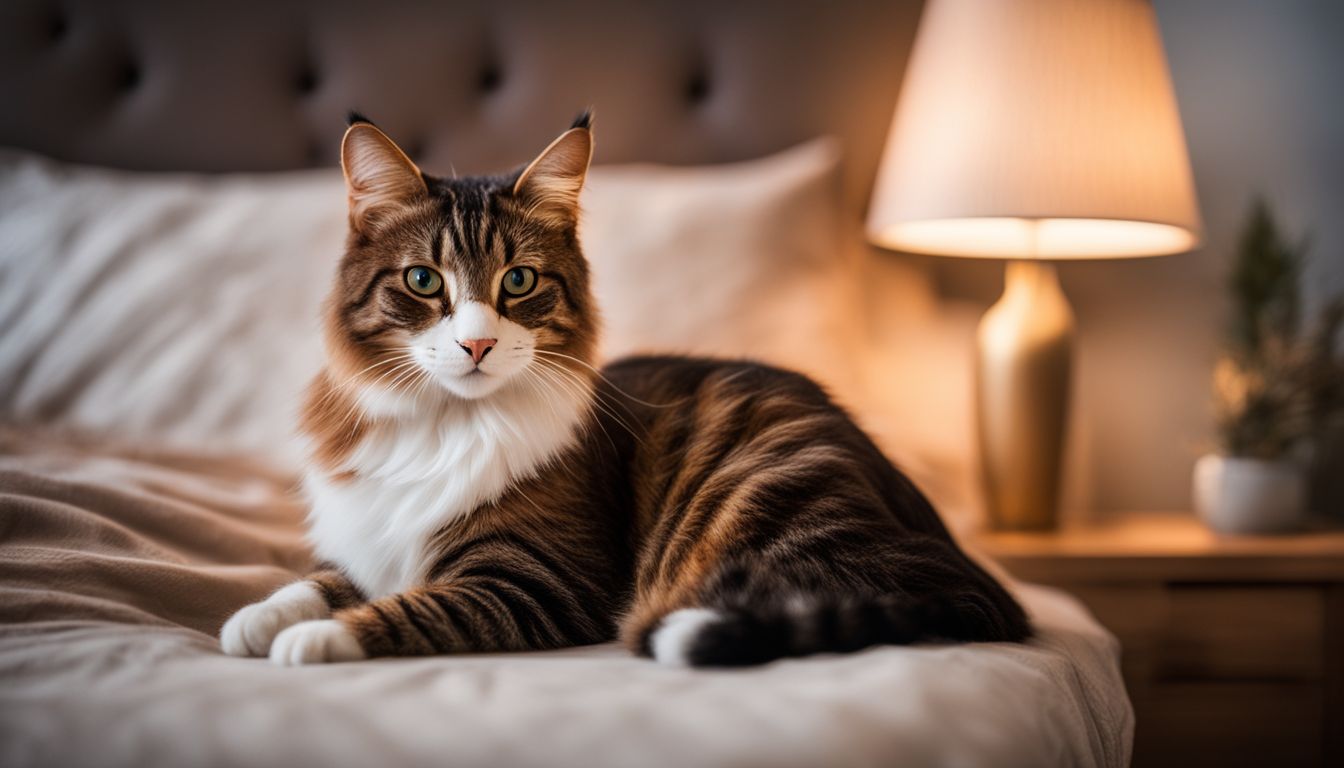
Investigate any potential medical issues and seek advice from a veterinarian or behaviorist.
Investigate any medical issues
If your cat continues to meow at night despite trying various solutions, it may be necessary to investigate any potential medical issues. Excessive meowing can sometimes indicate underlying health problems such as constipation, urinary tract infections, urinary stones, hyperthyroidism, or kidney disease.
It’s important to monitor your cat’s behavior and seek advice from a veterinarian or behaviorist who can provide guidance on identifying and addressing any medical conditions that may be causing the nighttime meowing.
Seek advice from a veterinarian or behaviorist
If your cat continues to meow at night despite trying various solutions, it’s important to seek advice from a veterinarian or behaviorist. They have the expertise and knowledge to assess your cat’s specific situation and provide tailored guidance.
A vet can rule out any underlying medical conditions that may be contributing to the nighttime meowing. A behaviorist can help identify any behavioral issues and create a customized plan to address them.
Remember, getting professional help is essential in finding the best solution for your cat’s nighttime meowing.
Conclusion
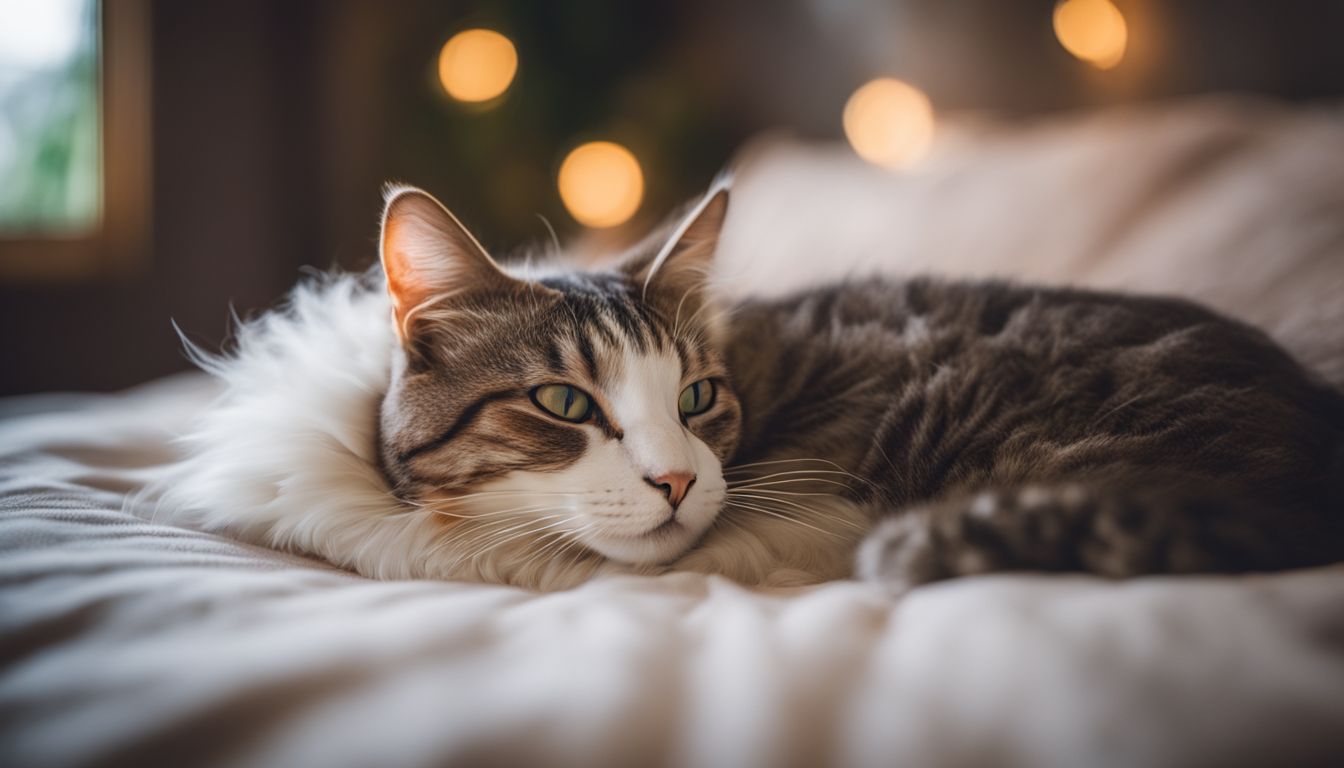
In conclusion, understanding why your cat meows at night is key to finding the right solution. Whether it’s seeking attention, hunger or boredom, there are ways to teach your cat to stay quiet.
By addressing their needs and establishing a bedtime routine, you can help create a peaceful night for both you and your furry friend. Remember, consistency is important in breaking the cycle of nighttime meowing.
FAQs
1. Why does my cat meow at night?
Cats may meow at night due to various reasons such as hunger, loneliness, boredom, or wanting attention.
2. How can I stop my cat from meowing at night?
To stop your cat from meowing at night, ensure it has a regular feeding schedule and plenty of toys for stimulation. Providing a comfortable sleeping area and spending quality time with your cat during the day can also help reduce nighttime meowing.
3. Is my cat meowing at night a sign of illness?
Excessive or unusual nighttime meowing in cats can be a sign of underlying health issues such as pain or anxiety. It’s best to consult with a veterinarian if you suspect your cat’s meowing is related to an illness.
4. Should I ignore my cat when it meows at night?
Ignoring your cat’s nighttime meowing may not be the best approach as it could escalate the behavior. Instead, try to identify and address the underlying reason behind the excessive vocalization.
5. Can playing with my cat before bedtime help reduce nighttime meowing?
Yes, engaging in interactive play sessions with your cat before bedtime can help tire them out mentally and physically, making them more likely to sleep through the night without incessant meowing.

